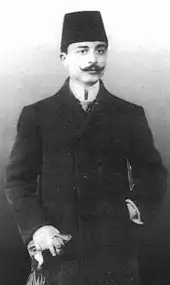Mehmet Kemal
Mehmed Kemâl Bey (March 1, 1884 – April 10, 1919) was an Ottoman administrative officer and teacher.

Early life and education
Kemâl was born on March 1, 1884 in Beirut to a family originating in Larissa (Thessaly). He was educated in Antalya and Izmir where he studied at modern-dayAnkara University.
Career
In 1909, he concluded his studies and became a kaymakam (provincial governor). In the 1915, he became the governor of Boğazlıyan province. He became one of the perpetrators of the Armenian Genocide. There was strong resistance to the massacres among the region's Turkish population.
Death
In 1919, he was tried by a military court and sentenced to death.[1] During the trial, he maintained that he was innocent and followed the orders he was given.[2]
On April 10, 1919 he was publicly hanged in Bayazit Square in Istanbul.
Aftermath
On October 10, 1922, Kemal was declared a "National Martyr" (Ottoman Turkish şehid-i millî, Turkish Millî Şehit) by the Grand National Assembly. In 1926, the Turkish State gifted his family two properties confiscated during the Armenian deportations. In 1973 his grave was renovated and Kemâl was given the title of "Martyr of the Nation". His grave was declared a memorial.[3]
References
- "Turks Hang Kemal Bey for Armenian Massacres". The New York Times. 14 April 1919.
- "The Execution of Mehmet Kemal Bey, kaymakam of Boğazlıyan". ANI Armenian Research Center. 14 March 2015.
- "Kaymakam Mehmed Kemal kimdir? Ne zaman ve neden idam edildi? İşte biyografisi". Karar. 14 April 2021. Archived from the original on 14 April 2021.